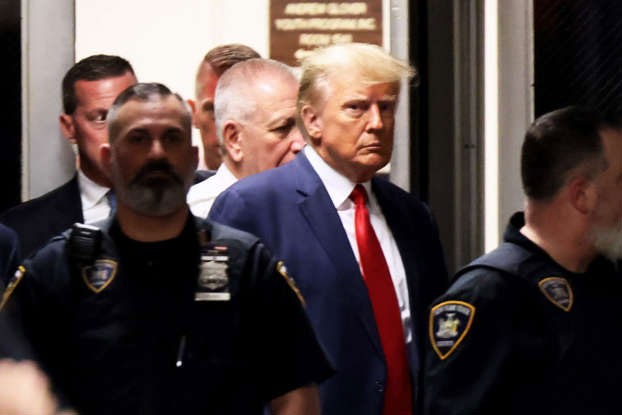The Daily Digest
Second criminal indictment looms for Trump as he seeks to regain the White House
Story by Zeleb.es • 12 June 2023
Federal indictment
Former President Donald Trump has been indicted on seven counts in the special counsel’s classified documents probe, making it the first time a former president has faced federal charges, serveral media reported.
Violation of the Espionage Act
The grand jurors concluded Trump violated a portion of the Espionage Act: US criminal code Section 793, which prohibits “gathering, transmitting or losing” any “information respecting the national defence”, by removing classified documents and storing them at his Mar-a-Lago property.
Obstruction of justice and false statements
Moreover, Trump was also indicted on charges of destruction or falsification of records, conspiracy and false statements, his lawyer told CNN. During the year-long investigation he made his Mar-a-Lago workers lie to investigators, according to The Independent.
Also indicted in March
This adds further weight to his legal baggage, since he was also indicted on March 30, that time on state charges, by the Manhattan district attorney, for paying “hush money” to an adult film star in 2016.
$130,000 in exchange for silence
Trump's personal lawyer Michael Cohen acknowledged arranging a $130,000 payment to adult film actress Stormy Daniels (pictured) in exchange for her silence about her sexual involvement with Trump in 2006.
Can Trump go to prison?
According to CNN analyst Zachary B. Wolf, “people do routinely serve prison time for retention of classified documents, conspiracy and obstruction, but top officials accused of wrongdoing also have historically found a way out of jail.”
Can Trump still be elected president?
The criminal indictments have raised a number of legal questions; one of them being: do criminal charges disqualify Trump from being elected president? The short answer is no.
Requirements for US presidency
Even though it was the first time a US president or former president was indicted, the country’s Constitution sets forth very explicit requirements for presidency: being at least 35 years old, a U.S. resident for 14 years and a natural-born citizen.
Governing from jail?
The Constitution does not require, however, that the president be free from indictment, conviction or prison. So a person under indictment or in prison may run for office and may even serve as president.
Core functions affected
That being said, Fortune Magazine recalled that the Department of Justice concluded, in a 1973 memo, that governing from jail would be extremely difficult as core functions would be affected.
The difficulties of governing from jail
According to the 1973 memo, “the President plays an unparalleled role in the execution of the laws, the conduct of foreign relations, and the defense of the Nation,” which include several meetings abroad, for instance.
Access to classified information from jail?
Moreover, presidents need access to classified information and briefings, which must often be stored and viewed in a secure room that has been protected against all manner of spying, something that’s likely unavailable in a prison.
Second criminal indictment looms for Trump as he seeks to regain the White House
Story by Zeleb.es • 12 June 2023
Federal indictment
Former President Donald Trump has been indicted on seven counts in the special counsel’s classified documents probe, making it the first time a former president has faced federal charges, serveral media reported.
Violation of the Espionage Act
The grand jurors concluded Trump violated a portion of the Espionage Act: US criminal code Section 793, which prohibits “gathering, transmitting or losing” any “information respecting the national defence”, by removing classified documents and storing them at his Mar-a-Lago property.
Obstruction of justice and false statements
Moreover, Trump was also indicted on charges of destruction or falsification of records, conspiracy and false statements, his lawyer told CNN. During the year-long investigation he made his Mar-a-Lago workers lie to investigators, according to The Independent.
Also indicted in March
This adds further weight to his legal baggage, since he was also indicted on March 30, that time on state charges, by the Manhattan district attorney, for paying “hush money” to an adult film star in 2016.
$130,000 in exchange for silence
Trump's personal lawyer Michael Cohen acknowledged arranging a $130,000 payment to adult film actress Stormy Daniels (pictured) in exchange for her silence about her sexual involvement with Trump in 2006.
Can Trump go to prison?
According to CNN analyst Zachary B. Wolf, “people do routinely serve prison time for retention of classified documents, conspiracy and obstruction, but top officials accused of wrongdoing also have historically found a way out of jail.”
Can Trump still be elected president?
The criminal indictments have raised a number of legal questions; one of them being: do criminal charges disqualify Trump from being elected president? The short answer is no.
Requirements for US presidency
Even though it was the first time a US president or former president was indicted, the country’s Constitution sets forth very explicit requirements for presidency: being at least 35 years old, a U.S. resident for 14 years and a natural-born citizen.
Governing from jail?
The Constitution does not require, however, that the president be free from indictment, conviction or prison. So a person under indictment or in prison may run for office and may even serve as president.
Core functions affected
That being said, Fortune Magazine recalled that the Department of Justice concluded, in a 1973 memo, that governing from jail would be extremely difficult as core functions would be affected.
The difficulties of governing from jail
According to the 1973 memo, “the President plays an unparalleled role in the execution of the laws, the conduct of foreign relations, and the defense of the Nation,” which include several meetings abroad, for instance.
Access to classified information from jail?
Moreover, presidents need access to classified information and briefings, which must often be stored and viewed in a secure room that has been protected against all manner of spying, something that’s likely unavailable in a prison.
11 months ago


